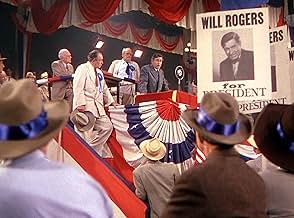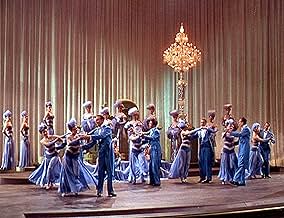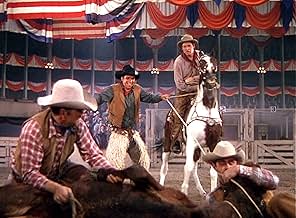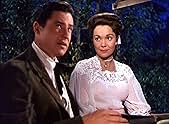AVALIAÇÃO DA IMDb
6,6/10
575
SUA AVALIAÇÃO
Adicionar um enredo no seu idiomaThe homespun humorist and social critic starts as a cowboy and goes on to vaudeville, movies, and radio.The homespun humorist and social critic starts as a cowboy and goes on to vaudeville, movies, and radio.The homespun humorist and social critic starts as a cowboy and goes on to vaudeville, movies, and radio.
- Direção
- Roteiristas
- Artistas
Todd Karns
- 1st Mechanic
- (cenas deletadas)
J. Carrol Naish
- Narrator
- (narração)
Dub Taylor
- Actor
- (cenas deletadas)
Victor Adamson
- Townsman Greeting Will
- (não creditado)
Leon Alton
- Rodeo Spectator
- (não creditado)
Avaliações em destaque
This is an excellent film with an outstanding cast, and a very authentic feel to the overall presentation. Will Rogers, Jr. becomes Will Rogers, Sr. This is a good story about an outstanding "American" personality, and it should definitely be made available on video for all "Americans" to see, especially during these trying times when patriotism, honesty and goodwill could use a shot-in-the-arm. Hopefully it will be make the step to video in the very near future.
I agree with the previous commenter about how good this movie is and would love to see it available on video. This movie was made in 1952 and starred Will Rogers Jr. It showed Will Rogers Jr, as his father, doing some performance on Broadway as well as some of the fund-raisers he did during the depression and more of the movies he made in Hollywood. However this website is showing a picture of a movie made in 1961, narrated by Bob Hope, and it is NOT the same movie that they are describing. The one narrated by Bob Hope, is available on video (dvd), and although it is a good biographical movie of Will Rogers, it is NOT the one starring Will Rogers Jr, or any of the other stars listed on this web site. They need to remove that picture as it can cause some confusion for some people.
When they discuss the great movies of director Michael Curtiz, they start with Casablanca, which may well be the greatest American movie - for which he earned a well-deserved Oscar - and go on to such screen gems as The Adventures of Robin Hood, Captain Blood, The Sea Hawk, Yankee Doodle Dandy (which is a slow movie with a great performance by its star), Life with Father, and a host of others. I doubt anyone would think to mention this movie.
And The Story of Will Rogers is not a great movie. It does not move with the relentless drive of Casablanca or Robin Hood, it does not sparkle like Life with Father. Seventeen years after his untimely death in 1935, it tells the story of the then still well-remembered American humorist, Will Rogers. Since everyone still knew his story then, the movie did not have to tell it; rather, it picked the moments that it wanted to stand out.
That isn't Rogers' years in the Ziegfeld Follies, which made him a household word, or his appearance in movies, even through, for a short while, he was the biggest box office attraction in talkies.
Rather, it concentrates on Rogers' support of General William (Billy) Mitchell and his efforts to get Congress to put money into air power at a time when the U.S. was pulling back into isolationism. World War II and the terrifying German blitzkrieg would eventually show that Mitchell and Rogers were right.
It also concentrates, in the last part, on Rogers' fund raising for the poor during the depths of the Depression. That, too, is an aspect of Rogers' career that is probably forgotten today.
This movie won't keep you glued to your seat. But it does serve to remind us, now that there are few among us who remember seeing and hearing Rogers, what warm-hearted pleasure he brought to Americans when so many of us needed a smile so badly. His sense of humor may seem corny today - it was corny back then, too - but there is a lack of nastiness or derision to it that I often miss today.
And The Story of Will Rogers is not a great movie. It does not move with the relentless drive of Casablanca or Robin Hood, it does not sparkle like Life with Father. Seventeen years after his untimely death in 1935, it tells the story of the then still well-remembered American humorist, Will Rogers. Since everyone still knew his story then, the movie did not have to tell it; rather, it picked the moments that it wanted to stand out.
That isn't Rogers' years in the Ziegfeld Follies, which made him a household word, or his appearance in movies, even through, for a short while, he was the biggest box office attraction in talkies.
Rather, it concentrates on Rogers' support of General William (Billy) Mitchell and his efforts to get Congress to put money into air power at a time when the U.S. was pulling back into isolationism. World War II and the terrifying German blitzkrieg would eventually show that Mitchell and Rogers were right.
It also concentrates, in the last part, on Rogers' fund raising for the poor during the depths of the Depression. That, too, is an aspect of Rogers' career that is probably forgotten today.
This movie won't keep you glued to your seat. But it does serve to remind us, now that there are few among us who remember seeing and hearing Rogers, what warm-hearted pleasure he brought to Americans when so many of us needed a smile so badly. His sense of humor may seem corny today - it was corny back then, too - but there is a lack of nastiness or derision to it that I often miss today.
Both Michael Curtiz and his longtime employer, Warner Brothers, showed a flair for biographies, and this one has been somewhat underrated. The story is the familiar one of the rise of a young man from obscurity to worldwide fame, and there are really no surprises here. Audiences at the time the movie came out (1952) probably knew much about Rogers' life anyway, though he is nowadays an almost forgotten figure. This movie is solid entertainment, nicely photographed in color, and Will Rogers, Jr. gives an excellent, engaging performance as his father. It is basically a series of cliches, which, once once accepts the premise, one can thoroughly delight in, as I did, as the skill with which such material is handled constitutes the pleasure of watching such a predictable movie as this.
Rogers was a huge star in vaudeville on Broadway and in the movies. He was also a newspaper columnist and radio commentator, and hugely popular in his day. His homespun humor has dated badly, but the rough and tumble world he came out of is fascinating to see recreated on screen. There are nice ironies in the movie, among them, Rogers' move from the "real west" (Oklahoma) to the "false west" (Hollywood). I also like the casting of the refined, almost patrician actor, Carl Benton Reid, as Rogers' father. The arrival of barnstorming aviator who lands literally in Rogers' backyard, is stunningly filmed, and one can't help get a lump in one's throat as soon as one learns his name: Wiley Post.
Rogers was a huge star in vaudeville on Broadway and in the movies. He was also a newspaper columnist and radio commentator, and hugely popular in his day. His homespun humor has dated badly, but the rough and tumble world he came out of is fascinating to see recreated on screen. There are nice ironies in the movie, among them, Rogers' move from the "real west" (Oklahoma) to the "false west" (Hollywood). I also like the casting of the refined, almost patrician actor, Carl Benton Reid, as Rogers' father. The arrival of barnstorming aviator who lands literally in Rogers' backyard, is stunningly filmed, and one can't help get a lump in one's throat as soon as one learns his name: Wiley Post.
It's early 20th century. Humble cowboy Will Rogers (Will Rogers Jr.) returns to Oologah, Oklahoma. Betty (Jane Wyman) takes little notice of another cowboy's arrival but soon the two become a couple. Eventually, he becomes one of the most popular American humorist and home-spun political commentator.
This is an autobiography of Will Rogers as told by his widow. Will Rogers is well before my time. He comes from another era. I don't know any specifics from his work but I do understand his general tone. It's a call to the old west and America's promise. He's a nice little guy and the little guy can be great in America. This movie taps into that. He's the regular Joe. I have no nostalgia for the man or the era. I do find this movie to give a sense of both. One thing I didn't know is that so much of his work is topical and political. There isn't much drama with this movie but it does what it's supposed to do.
This is an autobiography of Will Rogers as told by his widow. Will Rogers is well before my time. He comes from another era. I don't know any specifics from his work but I do understand his general tone. It's a call to the old west and America's promise. He's a nice little guy and the little guy can be great in America. This movie taps into that. He's the regular Joe. I have no nostalgia for the man or the era. I do find this movie to give a sense of both. One thing I didn't know is that so much of his work is topical and political. There isn't much drama with this movie but it does what it's supposed to do.
Você sabia?
- CuriosidadesThe real Eddie Cantor appears as himself in support of Will Rogers, Jr. who portrays his father, a contemporary of Cantor's. The next year Rogers, Jr. would return the favor, again appearing as his father in The Eddie Cantor Story. Both films were made by Warner Brothers.
- Erros de gravaçãoWhen Will Rogers is addressing the bankers at 1:17:00 in, there are 2 old style microphones on the table in front of him. The one on the left of the screen, Rogers' right, is missing one of the suspension springs between the mic cartridge and the frame. It also has no wire attached to it, so it couldn't possibly function.
- Citações
Will Rogers: Well it looks like the women are finally gonna get the vote. A lot of men say they shouldn't be trusted with it. Seems kind of silly to stop trustin' them now after eatin' their cookin' for 4000 years.
- ConexõesEdited from Rapsódia Azul (1945)
- Trilhas sonorasHome on the Range
(uncredited)
Music by Daniel E. Kelley
Lyrics by Brewster M. Higley
Played at the beginning and during the opening credits
Sung at the Rogers party and used often in the score
Principais escolhas
Faça login para avaliar e ver a lista de recomendações personalizadas
Detalhes
- Data de lançamento
- País de origem
- Idioma
- Também conhecido como
- The Story of Will Rogers
- Locações de filme
- Empresa de produção
- Consulte mais créditos da empresa na IMDbPro
- Tempo de duração1 hora 49 minutos
- Proporção
- 1.37 : 1
Contribua para esta página
Sugerir uma alteração ou adicionar conteúdo ausente

Principal brecha
By what name was A História de Will Rogers (1952) officially released in India in English?
Responda


































